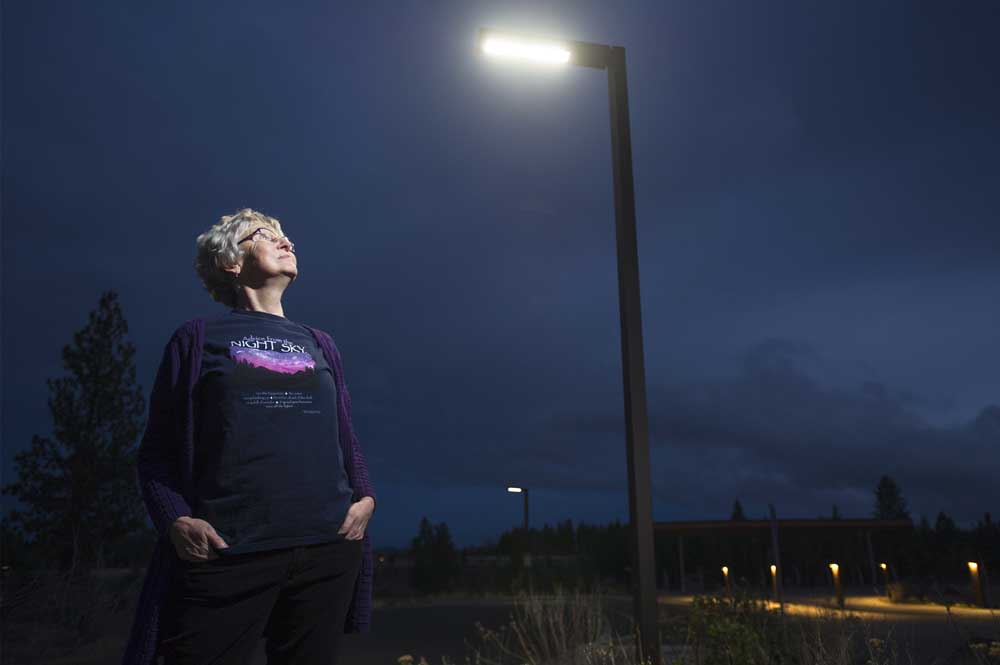Bend group wants darker skies
Published 12:00 am Friday, April 6, 2018

- These birds do better in darkness (so do we)Migratory songbirds such as the American robin — the largest and most widespread thrush in the state — and the Western tanager and grasshopper sparrow (pictured from top) are particularly susceptible to light pollution as they fly at night. Amphibians, flying insects and humans also are sensitive, in different ways. For us, it’s sleep.(Photos by ODFW (2) and U.S. Forest Service)
Bend at night is already darker than many cities around the country, but some residents want the city to do even more to become internationally recognized for its Central Oregon version of darkness.
The International Dark-Sky Association recognizes fewer than 20 cities in the U.S., Canada and Europe for showing “exceptional dedication” to preserving the night sky. A local volunteer group, Lights Out Bend, wants Bend to expand on its existing outdoor lighting laws to become the first community in the Pacific Northwest recognized by the association.
Robin Werdal, a volunteer with the group who spoke to the Bend City Council last month, said she’d like to see the city pass more ordinances regulating lighting. It would add to Bend’s reputation for eco-tourism, she said.
“I just think it’s a win-win thing,” she said. “There’s a lot of research out there showing how much damage is done by light pollution.”
City law already requires every outdoor lighting fixture installed since 2004 to direct light downward. It also bans advertising searchlights, requires sports stadiums and performance areas to extinguish outdoor lights within an hour of the final event of a night ends, and prohibits most neon lighting.
“The light that goes up, that’s a total waste,” Werdal said. “It’s a waste of light and energy.”
To become recognized for its darkness, Bend would also have to restrict the total amount of unshielded lighting, establish curfews or adaptive controls for public outdoor lights, and cap lighting density.
While Bend’s policies aren’t as restrictive as communities the association recognizes for their darkness, the city does do more to limit outdoor light than many cities, City Manager Eric King said during the council meeting Werdal attended.
“There’s a general theme that Bend leans more toward (dark skies),” King said, noting that Bend does light heavily used streets but is “not as aggressive as many other cities are in lighting residential areas.”
The wrong type of outdoor lighting is bad for humans, birds and amphibians, Werdal said. Migrating birds, particularly songbirds including warblers, thrushes, sparrows and tanagers, are distracted by the lights while flying at night, she said. And insects like moths are attracted to bright lights, to the point that they may spend all night buzzing around a bright light instead of feeding or reproducing.
Humans, too, aren’t made to be exposed to artificial light at night, said Dr. David Dedrick, medical director of the St. Charles Bend sleep center. People’s circadian clocks — the roughly 24-hour internal clock that shapes energy levels — developed hundreds of thousands of years ago, and the century or so of exposure to artificial light isn’t enough to change those biological rhythms.
Even a small amount of artificial light at night can shift circadian rhythms, leading to trouble sleeping, Dedrick said.
“It’s very bad to have light exposure in the middle of the night of any kind,” Dedrick said. “The less light exposure you get, period, the better you’re going to sleep.”
Some types of light are better for sleeping patterns than others, he said. Anything with a blue or green tinge — like a computer screen — is particularly bad. LEDs, which are becoming more commonly used for energy savings, are bad, as are fluorescents, he said. Incandescent bulbs are better for sleep, but they’re also far less energy-efficient.
Bob Warmbold, a certified lighting consultant who owns showrooms in Redmond and Lake Oswego, said LEDs can be dark-sky-friendly. Keeping lights pointed down and using fewer lumens — a measurement of visible light — both help, he said.
Warmbold said most customers are driven by what their homeowners associations require, but he’d like to see Oregon become a leader in dark-sky-friendly lighting. It would help people and animals, including sea turtle hatchlings on the coast that head toward light on the shore instead of the ocean, he said, and people don’t need much light at night.
“You don’t need a lot of light output to see at night because your eyes are already dilated,” he said.
— Reporter: 541-633-2160; jshumway@bendbulletin.com








